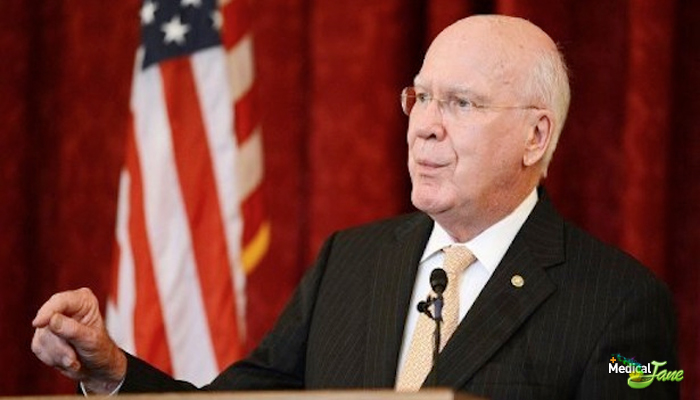
US Senators Meet To Discuss Conflicting Cannabis Policy
DOJ Memo Influenced Senator Leahy To Schedule Hearings
Senate Judiciary Chairman Patrick Leahy (D-VT) called for an unprecedented and historic Senate Judiciary Committee hearing yesterday. The hearing’s primary purpose was to discuss the conflicting nature of state and federal cannabis policy.It came less than two weeks after the Department of Justice (DOJ) released a memoranduminstructing law enforcement agencies on how deal with cannabis in legal states.
“The July raids in Washington, where recreational cannabis was passed last year, should offer clear proof of a broken promise.”
Despite the publicity that the Department of Justice’s memo generated, it’s contents were largely a reiteration of past statements.
A lot has been made about the DOJ, and US Attorney General Eric Holder, promising not to target patients/caregivers who comply with state laws, but this is nothing new. Similar promises were made in 2009 and 2011. The July raids in Washington, where recreational cannabis was passed last year, should offer clear proof of a broken promise.
The Department of Justice’s memo was intended to reduce confusion about their plans to enforce federal cannabis policy. Although the majority of the memo simply mirrored past DOJ statements, it outlined 8 federal priorities with regard to cannabis enforcement:
- Preventing the distribution of marijuana to minors
- Preventing revenue from the sale of marijuana from going to criminal enterprises, gangs, and cartels
- Preventing the diversion of marijuana from states where it is legal under state law in some form to other states
- Preventing state-authorized marijuana activity from being used as a cover or pretext for the trafficking of other illegal drugs or illegal activity
- Preventing violence and the use of firearms in the cultivation & distribution of marijuana
- Preventing drugged driving and the exacerbation of other adverse public health consequences associated with marijuana use
- Preventing the growing of marijuana on public lands and the attendant public safety and environmental dangers posed by marijuana production on public lands
- Preventing marijuana possession or use on federal property
Essentially, the memo urges states to develop strong, effective regulation systems and enforce them. It even suggests that the federal government won’t interfere where effective regulations are in place. However, the memo failed to offer clarity, and sparked an explicit interest in Tuesday’s hearing.
More Of The Same From Deputy Attorney General Cole
Although the Department of Justice’s memo answered a few questions about the treatment of medical cannabis, it left more to be desired. Because of this, Chairman Leahy called for a Judiciary Committee hearing to discuss the federal position on cannabis enforcement.
“The federal government has very scarce resources. I really don’t think we should be using them for low-level users of marijuana who are compliant with state laws.”— Sen. Patrick Leahy (D-VT)
Deputy Attorney General James Cole was in attendance to offer a better understanding of the Department of Justice’s position. However, he largely reiterated the importance of the 8 federal priorities. According to him, the DOJ expects effective regulation and enforcement from local and state government to protect the priorities.
Attorneys are expected to prosecute, in accordance with those guidelines, regardless of state law. D.A.G. Cole insisted that the Department of Justice will aggressively enforce federal policy when one or more of the 8 priorities have been comprised. In order to determine when to take action, the DOJ plans to continue approaching cannabis on a “case-to-case” basis.
Judiciary Committee, Speakers Call For Clearer Guidelines
Handling cannabis in such a way is meant to allow prosecutors to use professional discretion for individual cases, but it creates an unnecessary gray area for patients, law enforcement, and local businesses. Chairman Leahy raised this issue Tuesday in reference to federal banks as well; many banks don’t work with dispensaries, because they’re afraid of breaking money laundering laws.
John Urquhart, the Sheriff of King County, WA, spoke on the effect federal banks can have on legitimate cannabis businesses. He urged the federal government to allow banks to work with businesses licensed under state law. As he points out, the law forces businesses to operate on a cash-only basis. The excess levels of cash on-site lends itself to problems with violence and robbery.
“Cash-only businesses are prime targets for armed robberies.” — Sheriff John Urquhart
The inability to work with banks could lead to a dispensary violating one of the federal government’s 8 priorities with no fault of their own. They want to prevent violence, but armed robbery could be a direct result of federal banking policy. Allowing legitimate businesses access to accredited banks would help law enforcement prevent any cannabis-related violence.
The Judiciary Committee, namely Sen. Chuck Grassley (R-IA) and Sen. Sheldon Whitehouse (D-RI), also urged the Department of Justice to create clear metrics for prosecuting cannabis businesses. Instead of simply working on a case-to-case basis, the committee requested that the DOJ makes the prosecution policy as clear as possible. They hope to eliminate the confusion from conflictingcannabis policy.
The murky relationship between federal and state cannabis policies causes uncertainty and essentially forces businesses to operate on a cash-only basis. It is still unclear how the DOJ will treat the relationship between federal banks and those dispensaries who are operating legally and abiding by the priorities identified in the Cole memorandum.
Clearer guidelines from the Department of Justice would be welcomed by banks, patients, businesses, and local law enforcement. Further, they would aid state and local law enforcement protect the 8 priorities identified in the Cole memorandum.